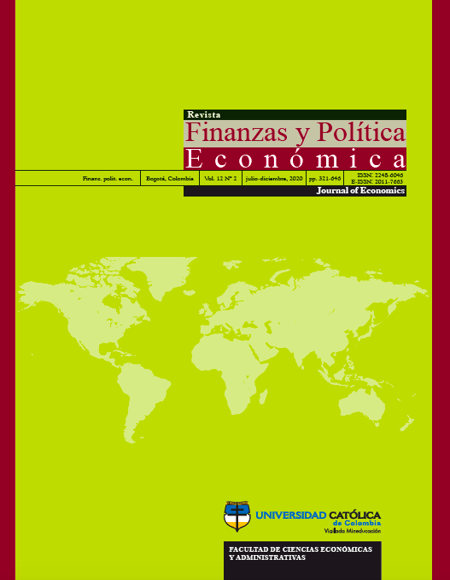Esta revista está autorizada por una licencia de atribución Creative Commons (CC BY-NC-SA 4.0) Attribution-Non Commercial 4.0 International. Para las licencias CC, el principio es el de la libertad creativa. Este sistema complementa el derecho de autor sin oponerse a este, conscientes de su importancia en nuestra cultura. El contenido de los artículos es responsabilidad de cada autor y no compromete, de ninguna manera, a la revista o a la institución. Se permite la divulgación y reproducción de títulos, resúmenes y contenido total, con fines académicos, científicos, culturales, siempre y cuando, se cite la respectiva fuente. Esta obra no puede ser utilizada con fines comerciales.
La revista no cobra a los autores por la presentación o la publicación de sus artículos
Resumen
Este artículo presenta un modelo para la producción de nuevo conocimiento sobre la relación endógena de actividades docentes y actividades investigativas. La descripción teórica del modelo expone los rendimientos a escala en función de una curva de aprendizaje. En esta, la existencia de una comunidad académica —en el sentido de Lakatos— es determinante para la generación de nuevo conocimiento
científico, pues contrarresta el caso particular de rendimientos decrecientes. La base para el ejercicio de Montecarlo fue construida sobre las características estadísticas de los registros de la producción científica de la Universidad Católica de Colombia, que constan en las revistas de economía desde el 2007 hasta el 2010, y permitió establecer dos conclusiones. La primera es que, ante rendimientos crecientes, las mejoras en el coeficiente de aprendizaje y en capital humano impulsan progresivamente la tasa de crecimiento de nuevo conocimiento, sin modificar las cantidades de capital y trabajo, combinadas en la tecnología inicial. La segunda conclusión muestra que el ritmo de crecimiento del coeficiente de aprendizaje por la práctica y en el capital humano aumenta la producción de nuevo conocimiento en forma continua cuando existe una comunidad académica, en relación con una tecnología con rendimientos decrecientes de un entorno
sin comunidad académica.

Citas
Aubad López, R. y Vásquez Caro, M. (1999). La consultoría económica: invitación a una discusión completa. En J. A. Bejarano (Ed.), Hacia dónde va la ciencia económica en Colombia. Siete ensayos exploratorios (pp. 209-241). Bogotá: Tercer Mundo Editores.
Bejarano, J. A. (Ed.). (1999a). Hacia dónde va la ciencia económica en Colombia. Siete Ensayos Exploratorios. Bogotá: Tercer Mundo Editores.
Bejarano, J. A. (1999b). La Investigación económica en Colombia. En Hacia dónde va la ciencia económica en Colombia. Siete ensayos exploratorios (pp. 179-204). Bogotá: Tercer Mundo Editores.
Congreso de la República de Colombia (1992). Ley 30 de 1992, por la cual se organiza el servicio público de la Educación Superior.. https://minciencias.gov.co/node/269
Congreso de la República de Colombia. (1994). Ley 115 de 1994, por la cual se expide la Ley General de Educación. http://www.secretariasenado.gov.co/senado/basedoc/ley_0115_1994.html
Congreso de la República de Colombia (2008). Ley 1188 de 2008, por la cual se regula el Registro Calificado de programas de educación superior y se dictan otras disposiciones. http://www.secretariasenado.gov.co/senado/basedoc/ley_1188_2008.html
González, J. I. (1990). La fetichización del currículo y la absolutización del libro de texto. En J. A. Bejarano (Ed.), Hacia dónde va la ciencia económica en Colombia. Siete ensayos exploratorios (pp. 53-87). Bogotá: Tercer Mundo Editores.
Ministerio de Educación Nacional (1999). Decreto 1655 de 1999, por el cual se crea la Orden a la Educación Superior y a la Fe Pública "Luis López de Mesa". https://www.mineducacion.gov.co/normatividad/1753/articles-185202_archivo_pdf_decreto_1655_1999.pdf
Ministerio de Educación Nacional (2008). Resolución 3010 de 2008. por la cual se reconoce el registro calificado a programas acreditados de alta calidad. https://www.cna.gov.co/1741/articles-186370_R3010.pdf
Nemet, G. F. (2006). Beyond the learning curve: Factors influencing cost reductions in photovoltaics. Energy Policy, 34(17), 3218-3232. https://doi.org/10.1016/j.enpol.2005.06.020
Plosser, C. (1989). Understanding real business cycles. Journal of Economic Perspectives, 3(3), 51-77. https://doi.org/10.4324/9780203443965.ch17
Presidencia de la República de Colombia (1994). Decreto 2904 de 1994, por el cual se reglamentan los artículos 53 y 54 de la Ley 30 de 1992. https://www.mineducacion.gov.co/1759/w3-article-104334.html?_noredirect=1
Presidencia de la República de Colombia (2003). Decreto 2566 de 2003, por el cual se establecen las condiciones mínimas de calidad y demás requisitos para el ofrecimiento y desarrollo de programas académicos de educación superior y se dictan otras disposiciones. Bogotá: Ministerio de Educación Nacional. https://www.mineducacion.gov.co/1759/w3-article-86425.html?_noredirect=1
Presidencia de la República de Colombia (2005). Decreto 4322 de 2005, por el cual se crea la Orden a la Acreditación Institucional de Alta Calidad de la Educación Superior “Francisco José de Caldas”. https://www.mineducacion.gov.co/1759/w3-article-382291.html?_noredirect=1
Presidencia de la República de Colombia (2010). Decreto 1295 de 2010, por el cual se reglamenta el registro calificado de que trata la Ley 1188 de 2008 y la oferta y desarrollo de programas académicos de educación superior. Recuperado de https://www.cna.gov.co/1741/articles-186370_Dec1295.pdf
Presidencia de la República de Colombia (2019). Decreto 1330 de 2019, por el cual se sustituye el Capítulo 2 y se suprime el Capítulo 7 del Título 3 de la Parte 5 del Libro 2 del Decreto 1075 de 2015-Único Reglamentario del Sector Educación. https://www.mineducacion.gov.co/1759/w3-article-387348.html?_noredirect=1
Sanz de Santamaría, A. (1999). Enseñanza de la economía: aspectos metodológicos y pedagógicos, en enfoque institucional Sanz de Santamaría Alejandro. En J. A. Bejarano (Ed.), Hacia dónde va la ciencia económica en Colombia. Siete ensayos exploratorios (pp. 89-140). Bogotá: Tercer Mundo Editores.
SCImago Journal y Country Rank (2010). Indicadores de producción científica en Economía para Colombia y América Latina. http://www.scimagojr.com/countrysearch.php?area=2000&country=CO&w=.
Sistema Nacional de Información de la Educación Superior (SNIES) (2009). Indicadores del Sistema de Educación Superior. Bogotá: Ministerio de Educación Nacional. http://www.mineducacion.gov.co/sistemasdeinformacion/1735/w3-article-212350.html.






























